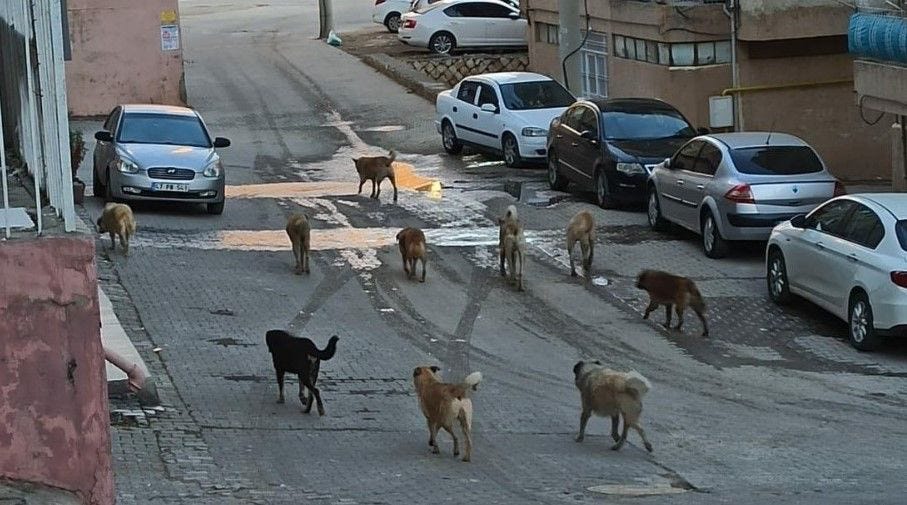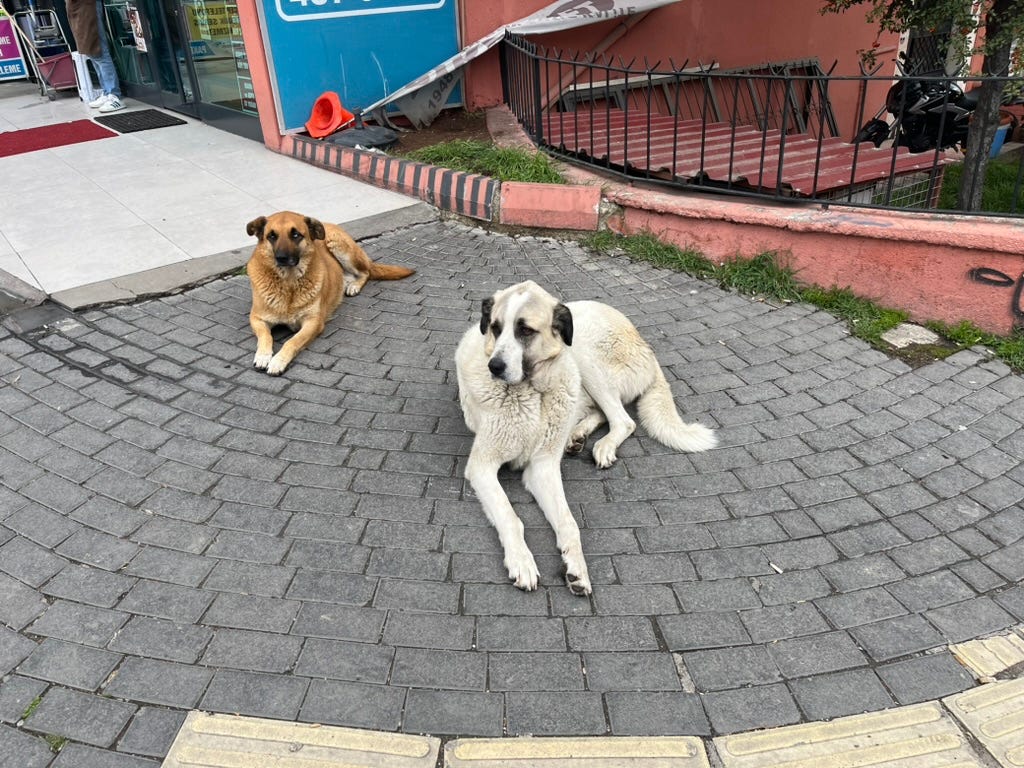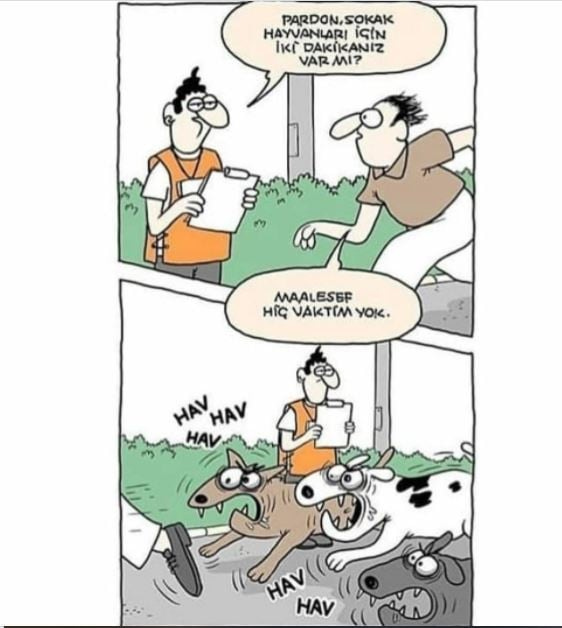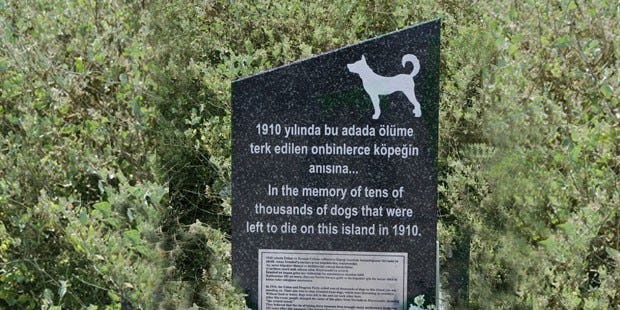One morning, not long ago, I woke up in our family home in southern İzmir. The fridge was empty, and I thought I’d go to the nearby shop to buy some bread and eggs.
I’ve always liked those morning walks to the store. I like the sound of the waves coming from the beach, the birds chirping.
So here I was, walking along, when a bunch of dogs suddenly came around the corner and started barking at me. There must have been four or five of them. A big white one had an especially vicious snarl.
We’ve always had stray dogs around, and some of them did bark, but not nearly this many, and not nearly this much. I wasn’t surprised though. The dog population has boomed across Turkey in recent years.
The dogs kept barking at me. The big white one was getting closer.
When dogs bark at you, the usual thing to do is to pretend to pick up a stone. Stray dogs in get stoned a lot, so most of them will run the moment they see a human form stoop for stone.
Not this gang. My threat didn’t even register with them. They were very loud, and I admit, dear reader, that I got a bit worried. I actually picked up some stones, put some in my pocket and kept a couple in my throwing hand. Then I stood tall and stretched out my arms to make myself as big as possible. I had seen in a documentary that this sometimes helps against bears. The dogs kept their distance, and after a while, stopped following me. No projectiles were necessary after all.
It turned out that the store was closed, and I went home across hostile territory, using the same tactics.
This sort of thing happens a lot these days. Turkey’s population of stray dogs has increased exponentially, to the point where their behavior has been changing. There’s regular reports of children and old people getting attacked. According to government sources, between May 2022 and December 2023, 93 people died in dog attacks. 40 of them were children. I’m not sure those are all stray dogs though. Some might be from dogs bred for fighting.

It’s hard to get reliable numbers on how many stray dogs there are. Official bodies estimate that there were 10 million stray dogs in May 2022, and that by December 2023, the number rose to 15 million. An AK Party parliamentarian has said that in ten years’ time, they estimated the population to reach 60 million. Those numbers are probably inflated, and I’m not sure that the population growth would be quite as dramatic as that. I’d point you to the excellent
post on the specifics.Still, something has to be done. Unsurprisingly, people have very different ideas of what that should be.
Why did this happen?
Municipalities usually collect stray cats and dogs, sterilize them, vaccinate them, tag them, and released back onto the streets. That’s generally been enough to keep the population in check.
It’s not always pleasant to see cats going through the trash or packs of dogs roaming the streets, but most of them aren’t harmful. Plus, they probably keep the rodent population down. While major Western cities like Paris and New York have huge rodent problems, places like Istanbul and Izmir are largely rodent free.

I haven’t been able to find a definitive report on why the dog population has gotten out of control. The pandemic definitely seems to have something to do with it. Perhaps they felt that people were more contained, and they could move around more freely.
I also suspect that people feed them more than they used to, and that there’s a reactionary element to that. Dogs are considered dirty in most Islamic cultures. Conservatives think it’s fine to keep them in the countryside, especially as sheep dogs, but not as domestic companions in cities. That, they say, is a Western convention, and therefore inappropriate. Violence against dogs is becoming more common, with some people torturing or killing them for pleasure.
So the treatment of dogs is a fault line in Turkey’s wider kültürkampf. Putting out some feed for your local dogs, naming them, maybe even taking them to the vet if they need it, has become a way of resisting the powers that govern the country. It’s probably not quite widespread enough to cause a population boom, but it’s probably one of the factors. I generally think it’s very nice for people to do this, especially if the dogs in question are already neutered.
Domestic pet ownership is a somewhat separate issue, and can also be problematic. There is a small, but loud class of rich city-dwellers who own pets and are rude to anyone who asks them to reign them in. Many of them also treat their pets very poorly, so the animas tend to be badly behaved. I have neighbors who keep their German Shepherd on their balcony all day. All day. The dog just barks at everyone walking by. When they do take him for a walk, he pulls like crazy. Such animals also often get abandoned. You sometimes see stray dogs that are popular breeds like golden retrievers, or probably were a generation or two ago.
Pondering mass culling
Whatever the reasons behind it, people now agree that the dog situation is out of control. The question is how to deal with it.
On the right, people want the state to kill all of the stray dogs. Hardline Islamist newspapers like Akit and Yeni Şafak are most fervent in their call for mass culling, while more mainstream outlets like Sabah and AHaber are a little more reserved on the matter, but advocate for the same measures.
The AK Party was preparing a pretty aggressive law in parliament. It was a scheme to collect dogs, keep them in care for 30 days (in the highly unlikely case they would be claimed) then kill them. They’re now reconsidering the law.
They tried on a few terms like “putting to sleep” and “euthanasia” before they settled on “culling” (itlaf), which does seem more appropriate, but ultimately there’s no going around it. This is a law that would kill millions of dogs, probably in terribly painful ways.

When the state gets ready to orchestrate killing on an industrial scale, though, some people get uncomfortable. States, after all, are incredibly powerful entities. It’s seldom good news for them to acquire a taste for blood.
And the Turkish state does have a history of getting carried away. In 1910, the Ottoman government ordered some 80,000 stray dogs to be collected and sent to Sivriada, one of the islands off Istanbul. The dogs were left there to fend for themselves, and eventually turned on each other. They say that the barking and howling could be heard all the way from the city. The island has since been called “hayırsızada” meaning “the inauspicious island.”

This was done under the Young Turk (İttihat ve Terakki) government. Some commentators pointed out that it was the same government that in 1915, ordered the mass displacement and killing of the empire’s Armenian subjects, remembered today as the Armenian genocide. I don’t in any way mean to equate the mass killing of dogs and people, but it doesn’t sound good.
Leftists and liberals have therefore been objecting on moral grounds. They want to find other solutions, even if it requires more resources. There have been calls for a massive sterilization drive, as well as identifying and isolating dangerous dogs.
A friend who knows her way around kennels tells me that culling can actually get more expensive, especially considering some of the chemicals involved. Meanwhile, sterilization and control takes a lot of organization, human resources and maintenance, which could have positive externalities like job creation, neighborhood cohesion, etc.
I might also point out here that our society already treats animals abominably. The meat industry breeds, feeds and slaughters animals literally on an industrial scale. As a mid-sized industrial country, Turkey contributes its fair share to this, breeding millions of farm animals, slaughtering and eating them.
So what if we add a few million dogs to that pile, you might say. It’s just a one-off.
But it does feel different, and I think it’s worth leaning into that difference. The millions of dogs that would be culled aren’t born into a cage somewhere, they’re born onto our streets. They eat and drink in our shadow. We anthropomorphize dogs. We give them names and think of them as having human characteristics, even if those aren’t really there. It feels very wrong to kill them.
The question, as I see it, is this: will the presidential palace listen to that feeling, or will they override it?
Note: I’m working on the final draft of my book, which is now scheduled to be published early next year. I’ll be sharing more information about that soon. Just a couple of weeks left to go!




For those who want a more balanced perspective on this issue, please use the translation utility provided by Twitter/X to read about a recent conflict between economically poor locals who are under attack by street dogs and the far richer, settler-minded street dog enthusiasts who leave their gated community, travel 10 km to a desolate Istanbul ghetto, and feed street dogs in front of other (far, far poorer) peoples' homes. These psychopaths frequently have active instagram and social media accounts where they film themselves feeding these dogs (again, not in their backyard, in someone else's), and ask for donations over paypal so they can more dog food. Of course, there is no accounting of spend, so they make far more than they use on dog food. This is unsustainable, diabolical, and inhuman. It says a lot about the social destitution of Turkish society, but it is primarily a public health and government inaction problem that needs a reset.
“…by December 2023, the number rose to 15 million. An AK Party parliamentarian has said that in ten years’ time, they estimated the population to reach 60 million. Those numbers are probably inflated, and I’m not sure that the population growth would be quite as dramatic …”,
you seem to underestimate the power of exponential growth. It’s highly likely that, if current trends are not halted, in 10 years they might exceed 60 million.